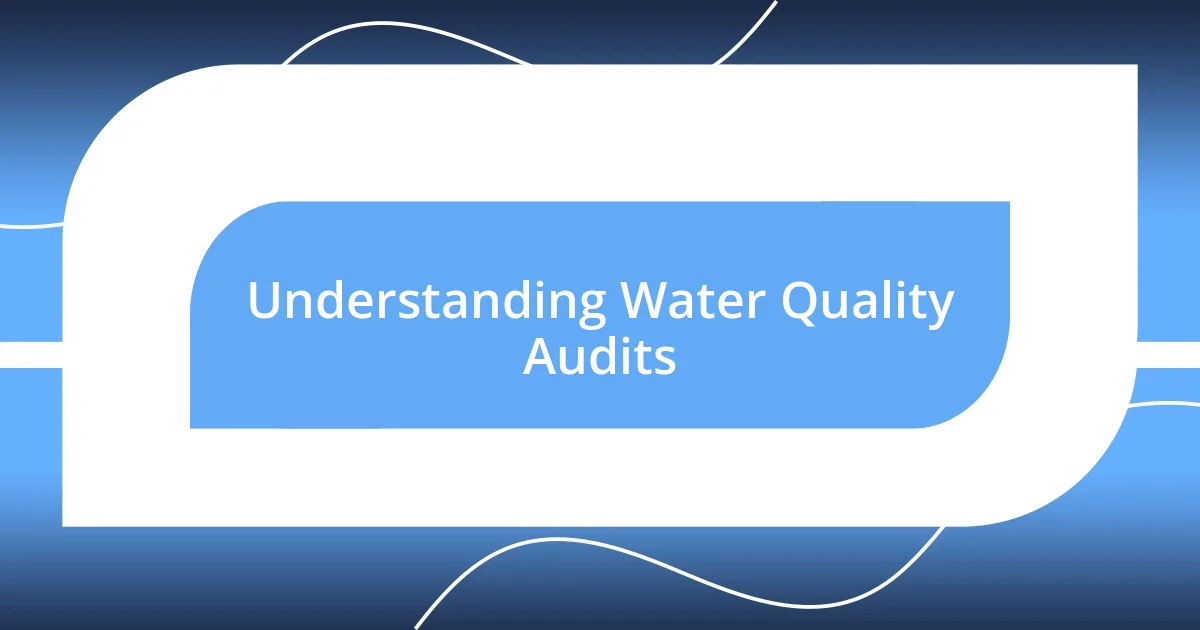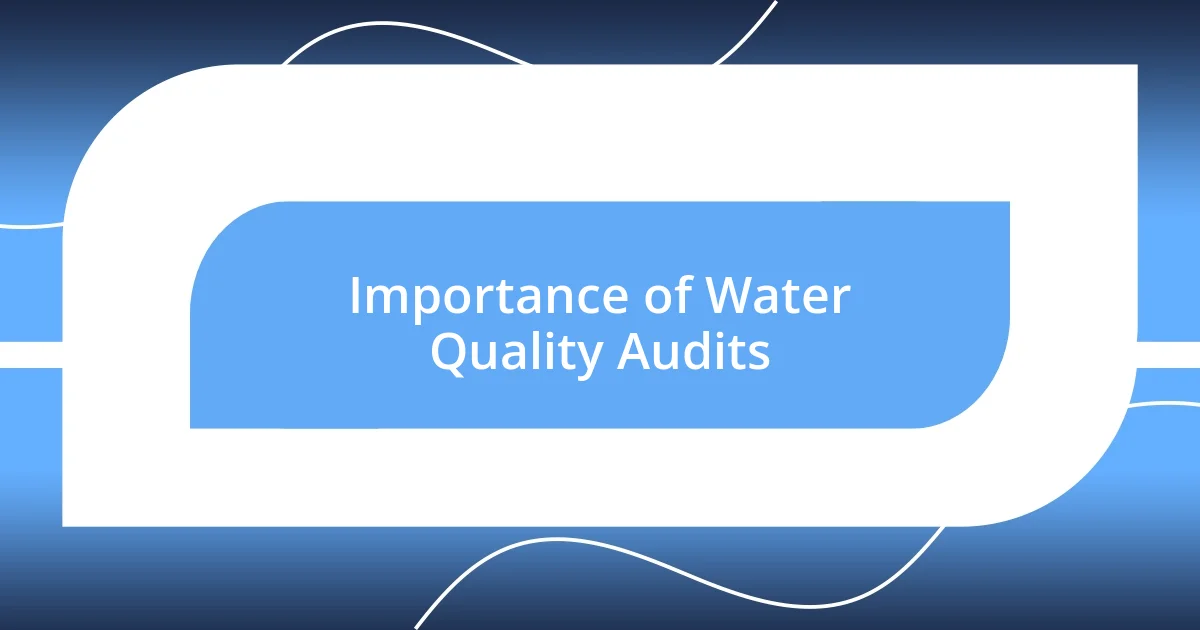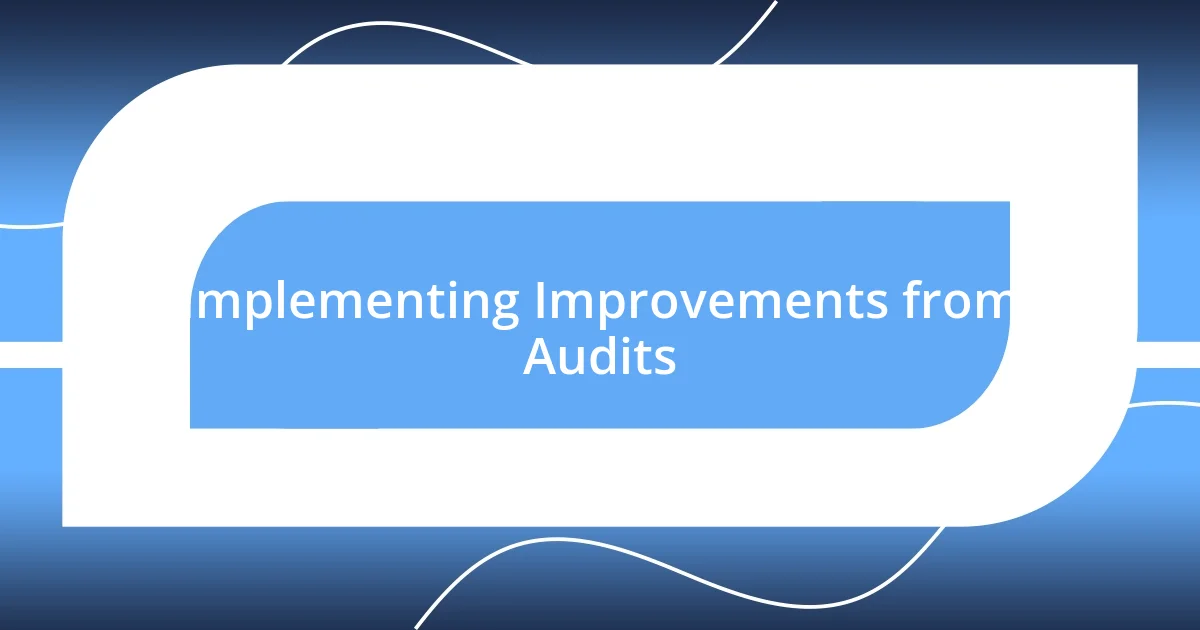Key takeaways:
- Water quality audits are crucial for ensuring safe drinking water and fostering community trust in local authorities.
- Small contaminants can have significant long-term health effects, highlighting the importance of audits in protecting public health.
- Implementing improvements identified in audits leads to tangible changes in water safety and encourages consistent monitoring practices.

Understanding Water Quality Audits
Water quality audits are essential assessments that help ensure our drinking water is safe and free of contaminants. I remember the first time I participated in an audit; the meticulous process of evaluating water samples sparked a genuine curiosity in me. It made me wonder: how often do we really think about what’s in the water we consume daily?
During an audit, various factors are scrutinized, including chemical, physical, and biological parameters. One striking moment for me was discovering how easily these factors can change based on environmental conditions. Isn’t it fascinating to think that something as simple as rainfall can drastically influence water quality?
These audits don’t just protect our health; they also have a profound impact on the community’s trust in local water authorities. I felt a sense of responsibility as I reviewed the findings, realizing that each piece of data could influence whether someone felt safe drinking the water from their tap. How can we underestimate the power of knowing our water is safe?

Importance of Water Quality Audits
When I first delved into water quality audits, I quickly grasped their critical role in safeguarding public health. It’s not just about checking off boxes; it involves assessing the intricate balance of various elements that can affect our water supply. A particularly memorable moment for me was when I realized that even small contaminants can have significant health implications over time. This awareness transformed my perspective on why these audits are vital—they are our frontline defense against potential hazards in our drinking water.
The importance of water quality audits can be summarized through several key points:
- Public Health Protection: Ensuring drinking water is safe and free from hazardous substances is paramount.
- Trust Building: Regular audits foster trust in water authorities, reassuring the community of their commitment to safety.
- Regulatory Compliance: These audits help facilities comply with environmental regulations, avoiding legal issues.
- Environmental Monitoring: They provide data on how environmental factors influence water quality, leading to better management strategies.
- Informed Decision Making: This process equips stakeholders with the necessary information to make educated decisions regarding water usage and infrastructure improvements.
Reflecting on these aspects, I appreciate how vital audits are not just for compliance but for nurturing a deeper connection to the water we often take for granted.

Implementing Improvements from Audits
Implementing improvements from water quality audits is where the real transformative action happens. I remember a particular instance when our team identified a recurring issue with a local water source. The moment we finally implemented a filtration system based on those audit findings, it felt like a weight had been lifted. It’s astonishing how putting theory into practice can lead to tangible change in our community’s water safety.
In another case, we recognized that our sampling frequency wasn’t sufficient to capture seasonal variations. Taking proactive steps to ramp up our testing not only addressed immediate concerns but also instilled a sense of vigilance within our team. This adjustment reminded me that we can’t afford to be complacent—consistency in monitoring is more than just a protocol; it’s a commitment to safeguarding public health.
Sometimes, I find myself reflecting on the ripple effects these improvements create. As we share our positive outcomes with the community, I can almost see their relief—a realization that their drinking water is being consistently monitored and improved. It makes me wonder, how many of us truly appreciate the systems in place that keep our water safe? Implementing changes based on audits deepens that appreciation and builds a stronger, healthier community.













